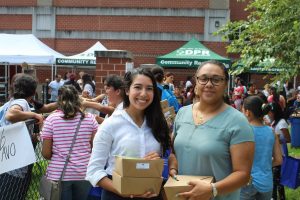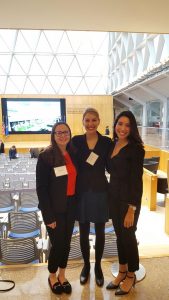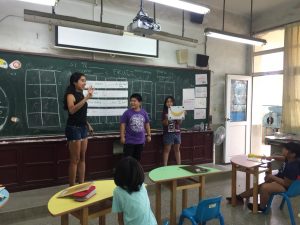What Does Education Have To Do With Peace and Security? A Lot More Than You Think
“Tell us more about this project you started, Breaking Cycle,” one of the Scoville board members asked me. As I prepared for my Scoville interview I typed up pages upon pages of notes covering everything from the Yemini civil war, to the Kurdish Women’s Protection Units, to the history of the FARC. I was prepared for just about any question, except this one because in all the interviews I had done, no one had ever brought it up.
I’m a first-generation American and college student—parts of my story that I never bring up in academic or professional settings unless pressed. This isn’t a conscious omission, but more so a product of the way my interactions in these environments usually go—there never seems to be an explicit reason for me to dig up that part of my story. Which is why I was pleasantly surprised that a group of people interviewing me for a position that would deal primarily with issues of peace and security was interested in my involvement with education advocacy. To me, the two are more closely linked than they might seem prima facie.

Liza with the Latino Student Fund coordinator after leading a financial literacy workshop at D.C. Public Schools’ Back to School Fair in August 2018.
I started the Breaking Cycle Project, after my first year at Wellesley College where three things became evident:
1. That I was incredibly privileged to be able to attend such an institution.
2. That my experience was inherently different because of my background.
3. That bridging the gap for first-generation college students is a critical, not just educational, but broader societal, issue.
I returned home the summer after my first year and started emailing educators in my county, pitching the idea of Breaking Cycle and asking them to let me come in to talk to students to demystify, from a peer perspective, what “going to college” meant. Slowly, the project took on the form of a blog platform and speaking engagements. Today, I, along with a partner, interview other first-generation students from across the country and ask them to share their stories which we feature on our blog. We go to schools and work with NGO’s to teach students skills that you don’t learn in a classroom, but that are critical to success—public speaking, networking, and how to write a good cover letter—to name a few. We share our backgrounds and experiences in hopes of encouraging other students to pursue their ambitions—no matter how audacious they might seem.
What does all this have to do with peace and security, you ask? Consider that many students who come from underrepresented and underprivileged groups don’t know about the range of fields they could specialize in or have access to opportunities that would enable them to break into those fields. I often hear the argument that maybe underrepresented groups, like women and people of color, just aren’t interested in issues of peace and security. I would argue that as groups that are primarily affected by these issues, particularly for women of color, it’s not the interest that’s absent, but rather the opportunity. As a society, we aren’t so great at capitalization—every year, massive amounts of talent are left on the table. Students burning with potential fall by the wayside in an educational system that tracks them, underfunds their schools, and simply isn’t designed to enable their success.

Liza with previous Scoville fellows at CSIS PONI’s fall 2018 conference at the United States Air Force Academy.
It is all too easy to focus on our specific niches and forget how our specialties and interests intersect with our broader society. I’m privileged to work with people who value incorporating diverse voices and perspectives into panels and conferences, but am conscious that not every environment mimics this dynamic. Many conversations surrounding diversity lament the dearth of people from underrepresented communities to choose from. Although I don’t believe that there aren’t talented and diverse voices already in the field, I strongly believe that there could be many more. We need to start asking ourselves how to get more diverse voices in the field, earlier, reaching out beyond the college community and going into high schools and even middle and elementary schools to share about the opportunities available in our field.
It’s too late to ask why more diverse applicants aren’t applying to highly selective positions post-college—“recruitment” starts from early childhood. Many of the students who have the potential to make excellent candidates post-college, never make it there. And even if they do, they must successfully navigate the labyrinth of academia, which is more difficult than we might think—currently, only 11 percent of low-income, first-generation college students graduate college within six years of enrolling.
I take comfort in that progress is being made. Programs like the Scoville fellowship are helping recent graduates bridge the opportunity gap by providing a means of coming to D.C. and working in this field. The fellowship gives unparalleled access to networking opportunities, mentorship, and leaders in the field. Brilliant women like Ambassador Bonnie Jenkins have created programs like Women of Color Advancing Peace and Security (WCAPS) to help nurture women of color who often find themselves to be the only ones in a room.

As a Fulbright ETA in Taiwan, Liza was able to marry her interest in education with that of international security.
However, there is still much work to be done and that work needs to start earlier in a student’s academic career. Education matters. Access to information matters. Consider that until college, I had no idea a field called “peace and security” existed—I fell into it by accident, but it could’ve easily bypassed me. A more diverse arena doesn’t only benefit the people whose voices will be heard, but our security community as well. Research has shown time and time again that more diverse teams frequently come up with more creative ideas and are more dynamic in their problem-solving. In a field as complex and critical as national security, it seems to me that we should be in relentless pursuit of acquiring diverse talent. It’s out there, we just need to look a little harder and start our search a little earlier.
Lizamaria Arias is a is a Fall 2018 Scoville Fellow with the Project on Nuclear Issues at the Center for Strategic and International Studies.
